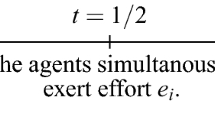Abstract
We consider a generalized team contest, in which the team’s effort is produced with a general technology represented by a concave homothetic function of team members’ contributions. Furthermore, we assume that the value of the contest’s prize depends on total effort exerted in the contest. We prove the existence of positive-effort Nash equilibrium for this generalized team contest under an arbitrary profile of the teams’ prize-allocation rules, and derive a simple characterization of the team-effort-maximizing prize-sharing rule. Although our basic model assumes that each individual in a group has constant marginal effort costs, it is possible to extend the results to the case where team members’ effort cost functions have increasing marginal costs with a constant elasticity.
Similar content being viewed by others
References
Amegashie, J.A., Kutsoati, E.: Rematches in boxing and other sporting events. J. Sports Econ. 6, 401–411 (2005)
Baik, K.H.: Contests with group-specific public-good prizes. Soc. Choice Welf. 30, 103–117 (2008)
Barbieri, S., Malueg, D.: Private information group contests: best-shot competition. Games Econ. Behav. 98, 219–234 (2016)
Barbieri, S., Topolyan, I.: Private-information group contests with complementarities. J. Public Econ. Theory 23, 772–800 (2021)
Barbieri, S., Kovenock, D., Malueg, D., Topolyan, I.: Group contests with private information and the “weakest link.” Games Econ. Behav. 118, 381–411 (2019)
Baye, M.R., Hoppe, H.C.: The strategic equivalence of rent-seeking, innovation, and patent-race games. Games Econ. Behav. 44, 217–226 (2003)
Brookins, P., Ryvkin, D.: Equilibrium existence in group contests. Econ. Theory Bull. 4, 265–276 (2016)
Burk, A.: Real income, expenditure proportionality, and Frisch’s “New methods of measuring marginal utility.” Rev. Econ. Stud. 4, 33–52 (1936)
Chang, Y., Luo, Z.: Endogenous destruction in conflict: theory and extensions. Econ. Inq. 55, 479–500 (2017)
Chung, T.: Rent-seeking contest when the prize increases with aggregate efforts. Public Choice 87, 55–66 (1996)
Corchón, L.C.: Theories of Imperfectly Competitive Markets, 2nd edn. Springer, Berlin (2001)
Cornes, R., Hartley, R.: Asymmetric contests with general technologies. Econ. Theory 26, 923–946 (2005). https://doi.org/10.1007/s00199-004-0566-5
Cornes, R., Sandler, T.: On commons and tragedies. Am. Econ. Rev. 73, 787–792 (1983)
Crutzen, B., Flamand, S., Sahuguet, N.: Incentive under list proportional representation. J. Public Econ. 182, 104109 (2020)
Crutzen, B., Konishi H., Sahuguet N.: Allocation rules of indivisible prizes in team contests. Econ. Theory (forthcoming)
Dasgupta, P., Sen, A., Starrett, D.: Notes on the measurement of inequality. J. Econ. Theory 6, 180–187 (1973)
Eliaz, K., Wu, Q.: A simple model of competition between teams. J. Econ. Theory 176, 372–392 (2018)
Epstein, G.S., Mealem, Y.: Group specific public goods, orchestration of interest groups and free riding. Public Choice 139, 357–369 (2009)
Esteban, J., Ray, D.: Collective action and the group size paradox. Am. Polit. Sci. Rev. 95, 663–672 (2001)
Esteban, J., Ray, D.: A model of ethnic conflict. J. Eur. Econ. Assoc. 9, 1496–1521 (2011)
Ewerhart, C., Quartieri, F.: Unique equilibrium in contests with incomplete information. Econ. Theory 70, 243–271 (2020). https://doi.org/10.1007/s00199-019-01209-4
Feng, X., Jiao Q., Kuang Z., Lu J.: Optimal prize design in team contests. J. Econ. Theory (forthcoming)
Fu, Q., Lu, J., Pan, Y.: Team contests with multiple pairwise battles. Am. Econ. Rev. 105, 2120–2140 (2015)
Garfinkel, M., Skaperdas, S.: Conflict without misperceptions or incomplete information: how the future matters. J. Conflict Resolut.Resolut. 44, 793–807 (2000)
Hartley, R.: Efficiency in contest between groups. In: Buchholz, W., Rübbelke, D. (eds.) The Theory of Externalities and Public Goods, pp. 7–27. Springer, Berlin (2017)
Kobayashi, K., Konishi, H.: Effort complementarity and sharing rules in group contests. Soc. Choice Welf. 56, 205–221 (2021)
Kolmar, M., Rommeswinkel, H.: Contests with group-specific public goods and complementarities in efforts. J. Econ. Behav. Organ.Behav. Organ. 89, 9–22 (2013)
Nitzan, S., Ueda, K.: Prize sharing in collective contests. Eur. Econ. Rev. 55, 678–687 (2011)
Nitzan, S., Ueda, K.: Intra-group heterogeneity in collective contests. Soc. Choice Welf. 43, 219–238 (2014)
Sanders, S., Walia, B.: Endogenous destruction in a model of armed conflict: implications for conflict intensity, welfare, and third-party intervention. J. Public Econ. Theory 16, 606–619 (2013)
Sato, K.: A two-level constant-elasticity-of-substitution production function. Rev. Econ. Stud. 34, 201–218 (1967)
Shaffer, S.: War, labor tournaments, and contest payoffs. Econ. Lett. 92, 250–255 (2006)
Simeonov, D.: Individual and team incentives in contests with heterogeneous agents. Ph.D. thesis, Boston College (2020)
Sydsæter, K., Hammond, P., Seierstad, A., Strom, A.: Further Mathematics for Economic Analysis, 2nd edn. Pearson, Oxford (2008)
Szidarovszky, F., Okuguchi, K.: On the existence and uniqueness of pure Nash equilibrium in rent-seeking games. Games Econ. Behav. 18, 135–140 (1997)
Tullock, G.: Efficient rent seeking. In: Buchanan, J.M., Tollison, R.D., Tullock, G. (eds.) Toward a Theory of the Rent-Seeking Society, pp. 97–112. Texas A&M University Press, College Station (1980)
Acknowledgements
We are indebted to Shmuel Nitzan and two anonymous referees for their useful comments and suggestions.
Funding
Japan Society for the Promotion of the Sciences Grants-in-Aid for Scientific Research (JSPSKAKENHI) Grant Number JP21K01550.
Author information
Authors and Affiliations
Corresponding author
Ethics declarations
Conflict of interest
The authors have no conflicts of interest directly relevant to the content of this manuscript.
Additional information
Publisher's Note
Springer Nature remains neutral with regard to jurisdictional claims in published maps and institutional affiliations.
Rights and permissions
Springer Nature or its licensor (e.g. a society or other partner) holds exclusive rights to this article under a publishing agreement with the author(s) or other rightsholder(s); author self-archiving of the accepted manuscript version of this article is solely governed by the terms of such publishing agreement and applicable law.
About this article
Cite this article
Kobayashi, K., Konishi, H. & Ueda, K. Prize-allocation rules in generalized team contests. Econ Theory (2024). https://doi.org/10.1007/s00199-024-01559-8
Received:
Accepted:
Published:
DOI: https://doi.org/10.1007/s00199-024-01559-8
Keywords
- Team contest
- Endogenous prize
- Heterogeneity and complementarity of members
- Prize allocation rule
- Group cost minimization



